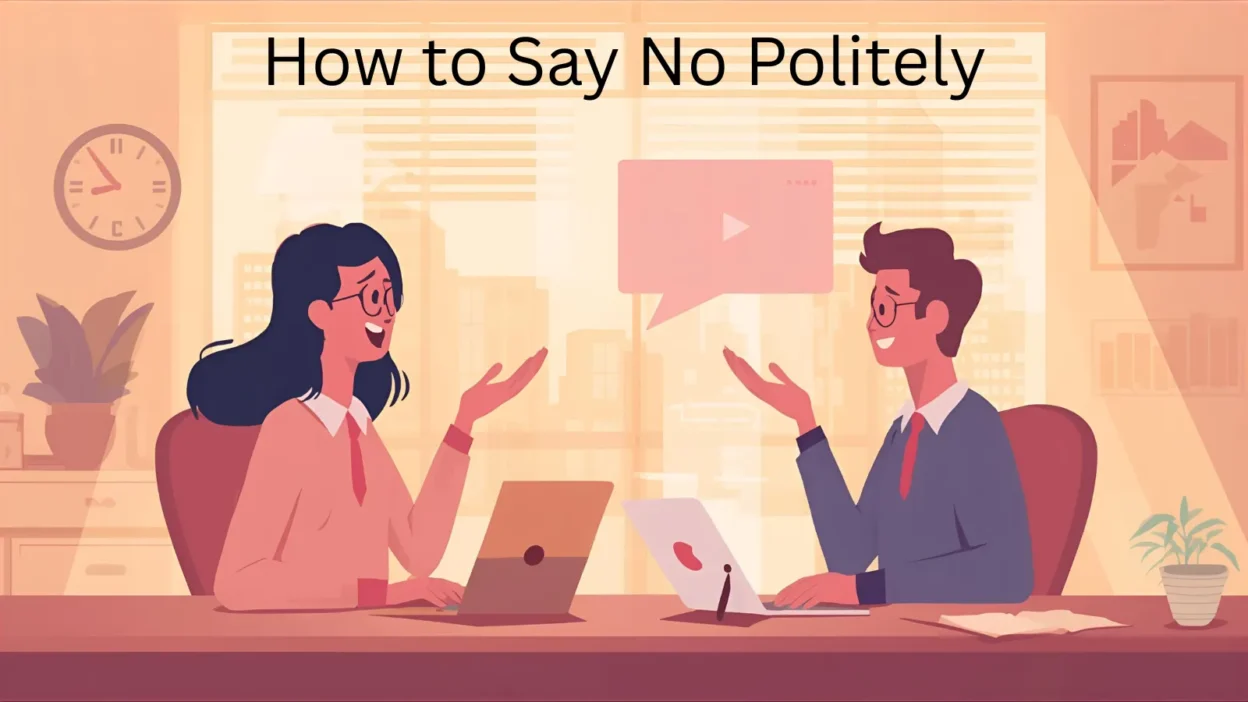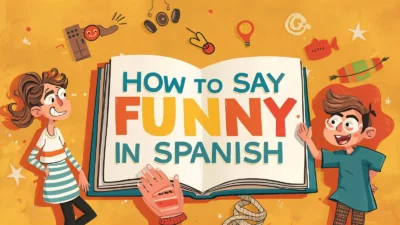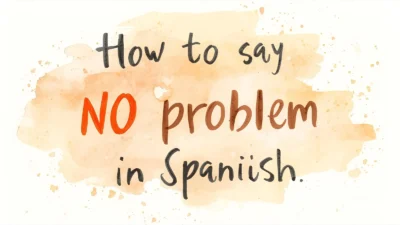Saying no politely means refusing a request in a respectful, kind, and clear way without hurting feelings. It helps you set boundaries while maintaining good relationships, whether at work, with friends, or in daily life.
Many users search for how to say no politely when they want to decline invitations, requests, or favors without sounding rude or awkward. The user intent is clear: they want simple, ready-to-use phrases that are gentle, professional, and easy to understand.
In this guide, you’ll learn polite ways to say no in different situations, using simple words and short sentences. These examples are beginner-friendly and help you communicate confidently while staying respectful and calm.
Say No Politely
Here’s a 15-phrases table for How to Say No Politely, with English meaning, example phrase, and context/usage:
15 phrases table for How to Say No Politely:
| # | English Meaning | Polite Phrase | Usage / Context |
|---|---|---|---|
| 1 | General refusal | No, thank you | Casual, polite |
| 2 | Too busy | I’m afraid I’m busy | Formal, professional |
| 3 | Cannot commit | I can’t at the moment | Everyday, polite |
| 4 | Declining politely | I’m sorry, I’ll have to pass | Neutral, polite |
| 5 | Offering alternative | I can’t, but maybe another time | Friendly, soft refusal |
| 6 | Not interested | I’m afraid this isn’t for me | Formal, neutral |
| 7 | Turning down help | I appreciate it, but I can manage | Polite, appreciative |
| 8 | Saying no at work | I’m unable to take this on | Professional setting |
| 9 | Declining an invitation | Thank you, but I must decline | Polite, social |
| 10 | Being honest | I’m not comfortable with that | Respectful, honest |
| 11 | Soft refusal | I’ll have to pass this time | Casual, friendly |
| 12 | Suggesting alternative | Maybe we can try another approach | Polite, constructive |
| 13 | Limited availability | I can’t commit fully right now | Work/professional context |
| 14 | Expressing regret | I wish I could, but I can’t | Polite, empathetic |
| 15 | Deflecting politely | That won’t work for me, sorry | Casual/professional mix |
1. No, thank you.

Origin:
A classic and universally polite response. Adding “thank you” softens the refusal and shows appreciation.
Example:
👤 User A: Would you like some dessert?
👤 User B: No, thank you. I’m full, but it looks delicious!
Use: Simple and polite in almost any social setting.
2. I appreciate it, but I’ll have to pass.
Origin:
A modern expression used in business and casual situations; shows gratitude before refusing.
Example:
👤 User A: Want to join our weekend hiking trip?
👤 User B: I appreciate it, but I’ll have to pass this time.
Use: Respectful and thoughtful for invitations or offers.
3. I’m afraid I can’t.

Origin:
This softens the refusal by implying regret. “I’m afraid” is a polite British expression that conveys reluctance.
Example:
👤 User A: Can you help me move this weekend?
👤 User B: I’m afraid I can’t—I’ve got prior commitments.
Use: Formal or professional settings.
4. Maybe another time.
Origin:
Popularized in casual conversation, this phrase leaves the door open for future opportunities.
Example:
👤 User A: Want to grab dinner tonight?
👤 User B: Maybe another time—I’ve had a long day.
Use: Friendly, non-final rejection.
5. I’d love to, but I’m already booked.
Origin:
Combines warmth with a scheduling conflict. A favorite in professional circles.
Example:
👤 User A: Can you attend the brainstorming session tomorrow?
👤 User B: I’d love to, but I’m already booked at that time.
Use: Courteous and responsible tone.
6. Unfortunately, that won’t work for me.
Origin:
Polite yet firm, this phrase is especially common in email or work settings.
Example:
👤 User A: Can we meet at 8 AM tomorrow?
👤 User B: Unfortunately, that won’t work for me. Can we do 10 instead?
Use: Neutral and professional.
7. Thanks, but I’ll pass.

Origin:
Casual American English. “Pass” comes from card games, meaning to skip a turn.
Example:
👤 User A: Want to try karaoke tonight?
👤 User B: Thanks, but I’ll pass—I’m not a singer!
Use: Informal but polite.
8. That’s kind of you, but I have to say no.
Origin:
Acknowledges the other person’s kindness before declining. Makes “no” feel less blunt.
Example:
👤 User A: I can lend you my notes if you need them.
👤 User B: That’s kind of you, but I have to say no—I’d rather take my own.
Use: Helpful for offers or help.
9. I wish I could, but I can’t.
Origin:
Used often in American English. Balances empathy and honesty.
Example:
👤 User A: Could you babysit for us tomorrow night?
👤 User B: I wish I could, but I can’t—I’ve got a family thing.
Use: Expresses sincerity and regret.
10. Not this time, but thank you.

Origin:
This polite refusal is common in customer service and polite social rejection.
Example:
👤 User A: Want to join the lunch group today?
👤 User B: Not this time, but thank you!
Use: Friendly and respectful.
11. I’m honored, but I can’t accept.
Origin:
Used in formal invitations or when offered a role/responsibility.
Example:
👤 User A: We’d like to nominate you for team lead.
👤 User B: I’m honored, but I can’t accept at this time.
Use: High-respect situations like awards or roles.
12. It’s not really my thing, but I appreciate the offer.
Origin:
Slang-influenced phrase, common among younger speakers to turn down hobbies or social activities.
Example:
👤 User A: Wanna join our horror movie night?
👤 User B: It’s not really my thing, but I appreciate the offer.
Use: Casual, suitable among friends.
13. Let me think about it and get back to you.
Origin:
Used to delay a decision respectfully; common in negotiations or uncertain decisions.
Example:
👤 User A: Can you take on this new project?
👤 User B: Let me think about it and get back to you tomorrow.
Use: When you’re unsure or need more time.
14. I don’t think I’m the right person for that.
Origin:
Professional way of saying “no” without offending, especially in workplace contexts.
Example:
👤 User A: Could you lead the training session next week?
👤 User B: I don’t think I’m the right person for that—but I can suggest someone else.
Use: Professional, helpful, and deflective.
15. No, but thanks for thinking of me.
Origin:
A warm and kind phrase that highlights appreciation and thoughtfulness.
Example:
👤 User A: We’re organizing a surprise party—want to help?
👤 User B: No, but thanks for thinking of me. I hope it turns out great!
Use: Very friendly and thoughtful.
FAQs
- What is the best way to say no politely in English?
You can say “No, thank you” or “I’m afraid I can’t.” - How do you say no politely in a formal situation?
Use phrases like “I’m sorry, but I won’t be able to” or “Unfortunately, I must decline.” - How do you refuse an invitation politely?
Say “Thank you for inviting me, but I can’t make it.” - How do you say no politely in a casual situation?
Say “No, thanks” or “Not this time, but thank you.” - How do you say no politely by email?
Use phrases like “I appreciate the offer, but I must decline.” - Can you soften a “no” with other words?
Yes, use words like “unfortunately,” “I’m afraid,” or “regretfully.” - How do you say no politely without sounding rude?
Always thank the person first and then give your refusal. Example: “Thank you, but I can’t.” - How do you decline help politely?
Say “Thank you, but I’ve got it covered.” - Can you say no politely in person and on the phone?
Yes, the same polite phrases work in both situations. - Why is it important to say no politely?
Saying no politely keeps relationships positive and shows respect.
Conclusion:
Mastering how to say no politely allows you to communicate your boundaries clearly without offending others. Whether in personal or professional situations, using polite refusals helps maintain respect, trust, and smooth interactions. With the right phrases, saying no can feel natural, confident, and considerate.



